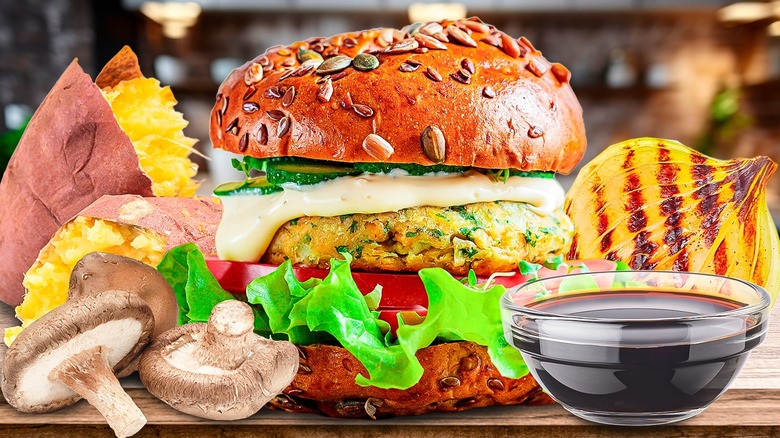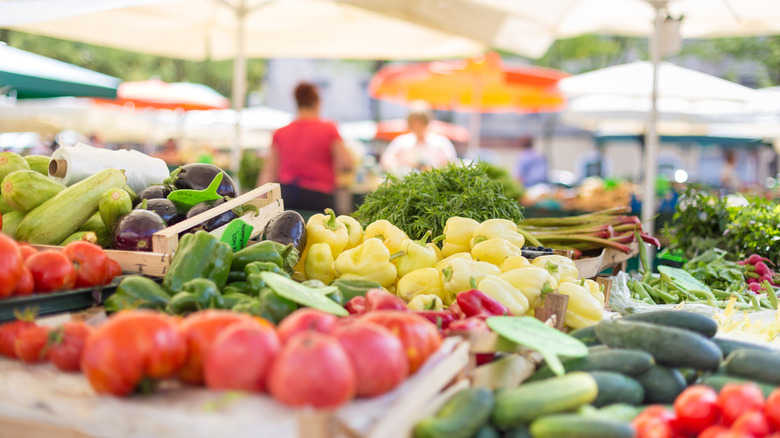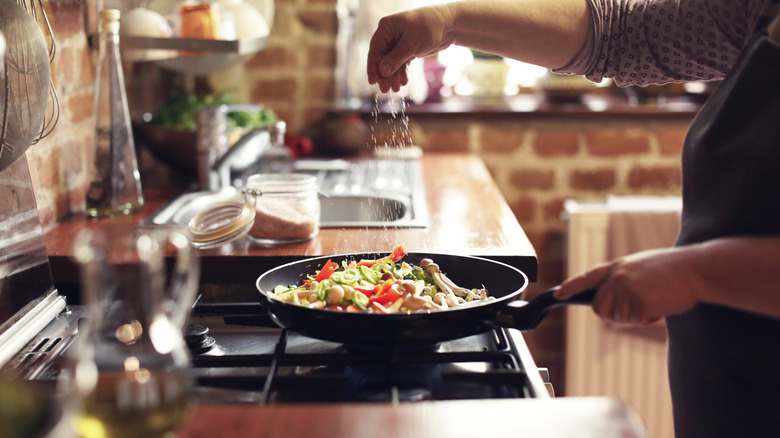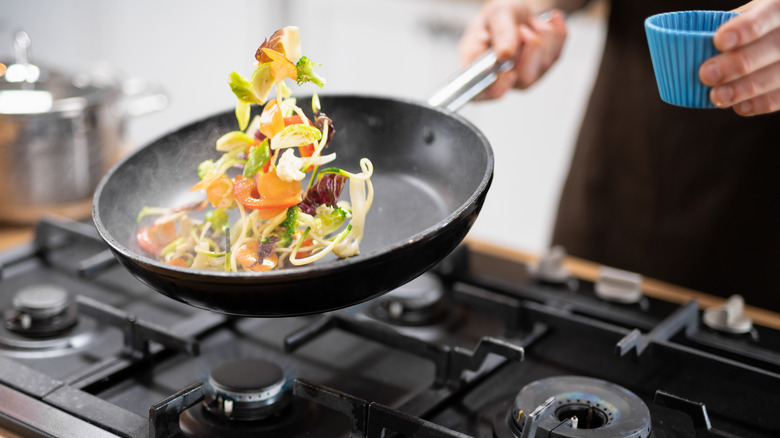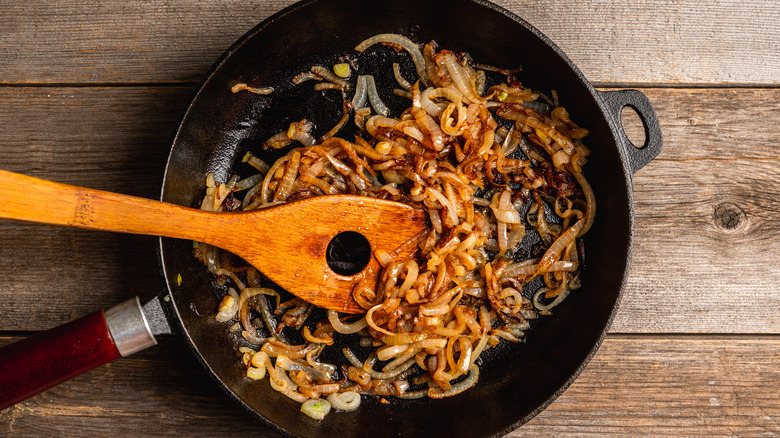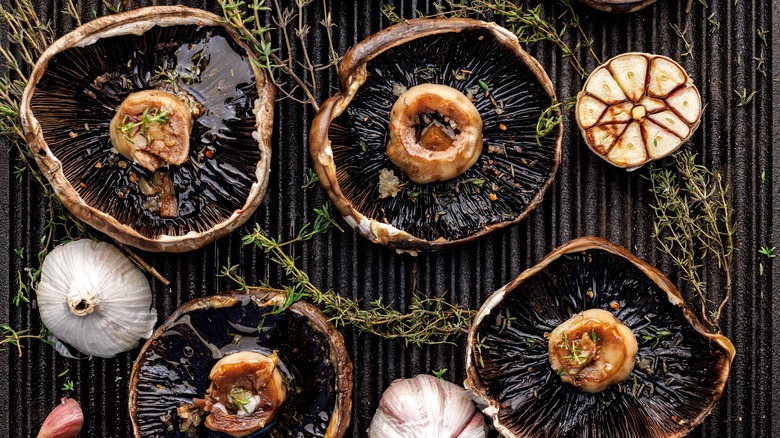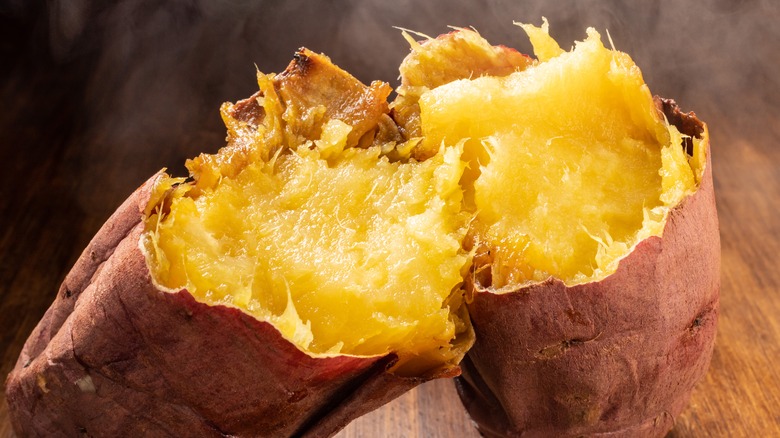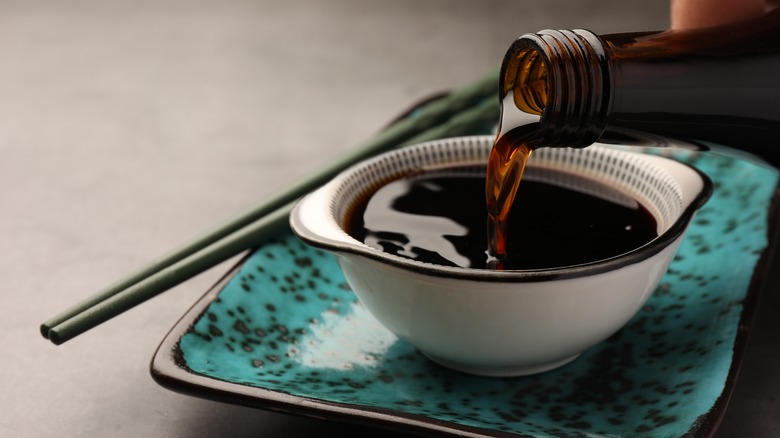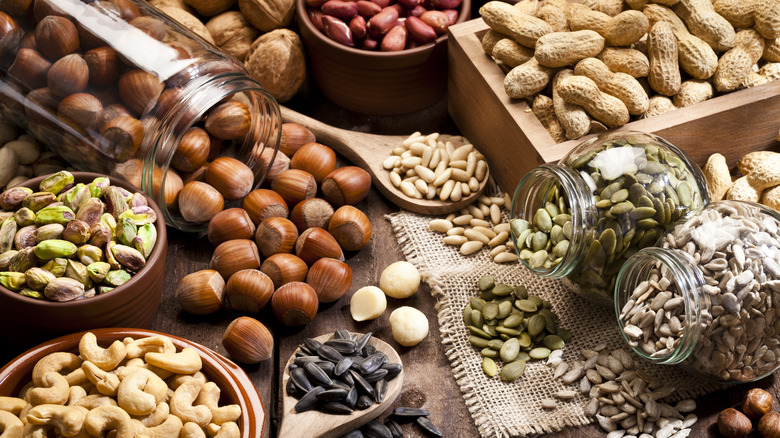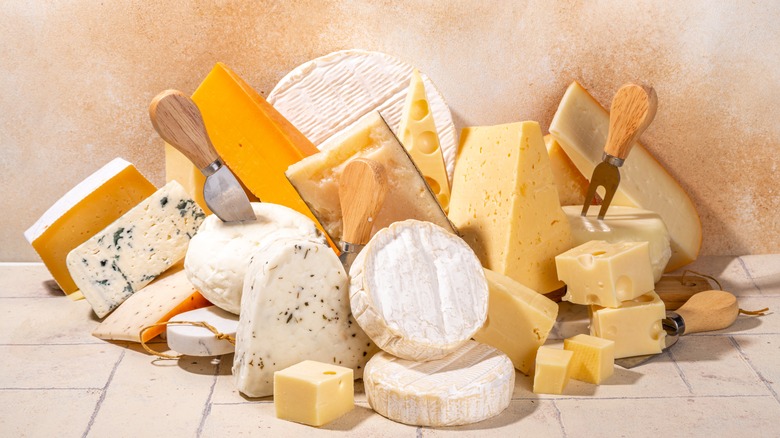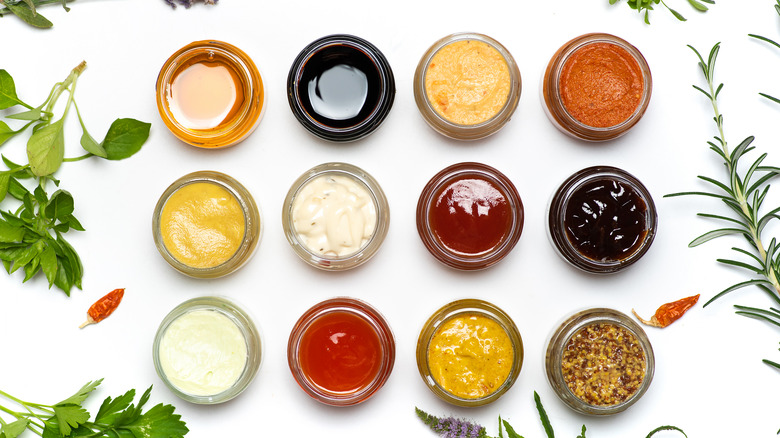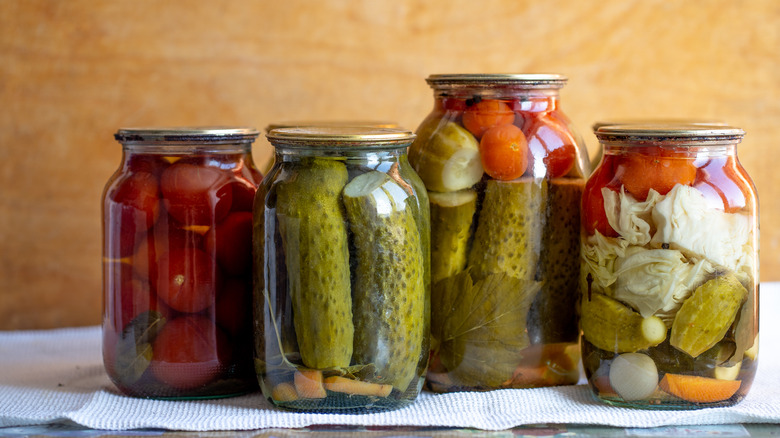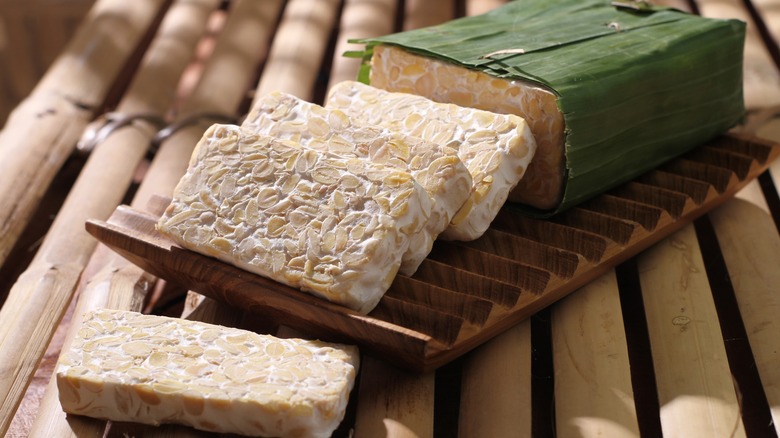12 Ways To Add Flavor To Your Vegetarian Burgers
You might think you know veggie burgers, but it's hard to keep track of all the different types of flavorful fillings that are increasingly available to vegetarian and vegan burger lovers. While plant-based burgers sometimes get a bad reputation for lacking the savory, umami taste of their meat-based cousins, there is no reason to eat a veggie burger that isn't absolutely packed with flavor.
Veggie burgers first came on the food scene in the early 1980s, and were initially viewed as an alternative for counterculture vegetarians, but things have changed since then. With growing research showing the health benefits of a plant-based diet, even some die-hard meat eaters are trying to cut down on their meat intake in favor of vegetable substitutes. Veggie burgers are a great place to start, with their versatility and wide range of flavors.
Contrary to what some people might think, some of the tastiest burgers out there are veggie burgers — you just have to know how to make them burst with flavor.
Find fresh ingredients
It might sound obvious, but to cook yourself up a delicious, flavorful veggie burger, you've got to start out with delicious, flavorful ingredients. Using fresh, local, and in-season ingredients can level up the taste of your veggie burger. Not only are they more sustainable, but they have more nutrients and they taste better.
Depending on the type of veggie burger you're making, common meatless-patty ingredients include mushrooms, onions, carrots, corn, beets, peas, and spinach, all of which can be found at a farmers market or local-produce supplier to guarantee that you're getting the freshest foodstuffs possible. For toppings, nothing compares to the crunch of fresh lettuce and a slice of locally grown vine-ripened tomato, sure to catapult your veggie burger into gourmet territory. And although superior taste and more nutrients are great reasons to buy produce locally, they aren't the only reasons. Shopping for ingredients from local suppliers cuts down on carbon emissions that result from long-distance transportation, so you can also rest assured that you're benefiting the planet as well as your taste buds.
Season as you go
When sinking their canines into a veggie burger, carnivores often complain that it lacks the salty, meaty punch that they've come to expect from a beef burger. Since veggie burgers don't rely on animal fat for flavor, they need more seasoning than you might expect. When preparing your ingredients, you want to be sure to salt them at every stage of the process, and not just at the end when you're about to use the mixture to form patties.
One of the advantages of making veggie burgers instead of meat burgers is that you can taste them at each stage of preparation, so you can continuously fine-tune your seasonings as you go. Salt also helps draw water out of the foods being cooked, which concentrates the flavor of each individual ingredient so that it packs the maximum flavor. The reduced moisture also means that your veggie-burger mixture is less likely to become gooey and fall apart during the cooking process.
Salt is arguably the king of seasonings, but there are plenty of flavorful spices that you can add to your veggie burger depending on what taste sensations you're going for. Chili powder and paprika are both great options for a black bean burger if you're looking to give it a slight Mexican twist, or you can try adding cumin and garam masala for an Indian-style burger.
Sauté your veggies
When making veggie burgers, you might think it's enough to throw all the ingredients together, form a few patties, and hit the grill — but veggie burgers are more than just the sum of their parts. When you're preparing the different vegetables that are going to go into your mixture, you should sauté them first. The first reason is flavor. Sautéing your vegetables gives them a nice, smoky char on the exterior. This translates to a more rich, complex taste when you bite into your burger, so your vegetables should be charred by the time you're mixing them with your other patty ingredients.
The second reason is texture. The last thing you want when serving veggie burgers is for the patties to be soggy and squishy, so that they don't hold their shape when you take a bite. When you sauté your vegetables, the process removes some of the naturally present moisture, which means that your burgers are less likely to get soggy when you cook them. As the moisture is drawn out of the vegetables, you're left with more concentrated veggie flavors.
Top with caramelized onions
It's easy to love caramelized onions. Their sweet, savory, umami flavor hits your tongue everywhere necessary to provide a punch of flavor that makes the taste of any accompanying veggie go just a little bit further. Onions have a naturally high sugar content compared to most vegetables, so when they're cooking in the pan, the sugar reacts with the heat to create new chemical compounds that taste nutty, rich, and slightly charred. The subtle sweetness is a great way to balance the savory flavors of your veggie burger, and gives you that onion flavor without being overwhelming.
The key to foolproof caramelized onions is patience. You have to cook them low and slow for a long time with a bit of oil and salt (to draw out the moisture). Adding a little vegetable broth throughout the cooking process is a great way to add more flavor and prevent the onions from drying out. You want to be sure not to turn the heat up above medium-low to prevent the onions from burning, and stir periodically for about 45 minutes. In the end, when you're serving up veggie burgers with a rich, complex flavor palette that rivals any restaurant, you'll be glad you took the time.
Put a portobello on it
Mushrooms can be an excellent source of umami flavor that can enhance your veggie burger by providing a meaty flavor without the actual meat. Portobello mushrooms have a robust texture and savory flavor that make them a perfect addition to any veggie burger that needs a little extra depth. Compared to most mushrooms, portobellos are big. With a diameter of about 4-6 inches, these fungi are about the size of a hamburger patty — and when they're cooked, they have a deep-brown color that also slightly resembles a classic beef patty.
While portobello mushroom caps are often used on their own in place of a hamburger patty, you can also plop one on top of your veggie burger for a double-decker with an extra burst of flavor. Portobellos also lend themselves to a diverse array of preparation techniques. They're hearty enough to marinate, so you can infuse them with herbs and spices, and they also look and taste great with the characteristic marks that you can get from cooking them on a grill or grill pan. Any way you dress them up, portobellos are sure to add a big boost to your veggie burger.
Use sweet potatoes as a base
There are about a million and one ways to make a veggie burger. Any vegetables that you can mash up and form into a patty can pretty much pass for a burger ... but in the eyes of a veggie-burger connoisseur, not all vegetables are created equal. Although spuds may not be the first ingredient that comes to mind when you think of a burger, with their flavor, texture, and excellent nutritional profile, sweet potatoes give a new meaning to veggie burgers.
When you bake a sweet potato, the inside naturally becomes soft, so it's super easy to mix with other ingredients and form a patty. They have a subtly nutty, earthy flavor that is not overpowering, so you have a wide latitude for adding other ingredients to flavor your burger just how you want it. Spices like ginger, turmeric, and cayenne pepper are great additions to a sweet-potato veggie burger, and adding herbs like cilantro gives the patty a nice freshness. Since sweet potatoes are on the moist side, you can use breadcrumbs to prevent your patties from getting too mushy. Also, before putting them on the grill, let the patties sit in the refrigerator for about 20-30 minutes. This helps them hold their shape while cooking.
Boost the umami flavors
A good burger is savory, hearty, and rich, with plenty of umami flavor to tantalize the taste buds. Although beef is a famously rich source of umami flavor, there are plenty of vegan and vegetarian ingredients that you can add to your veggie burger that also pack a huge amount of umami. For instance, in addition to salt you can season your veggie burger with soy sauce, which is fermented and has a rich flavor profile that adds more meaty flavor to your patties.
Miso paste is another option that you can mix right in with other veggie burger ingredients. It's also fermented, and has a slightly sweet, nutty, and tangy taste that can enhance the other flavors in your veggie burger. Nutritional yeast is another versatile ingredient with an umami flavor profile that is packed with nutrients, protein, and a unique cheesy taste that is sure to boost your veggie burgers. So, when you think burger, think umami.
Throw in some nuts and seeds
Although vegetables are the most obvious ingredients for a veggie burger, there are plenty of additional foodstuffs out there that will elevate the flavor and nutritional value, turning your burger into a plant-based powerhouse. Nuts and seeds are a great way to incorporate a delicious, subtle flavor and nutty crunch into your patty. But don't just go throwing any old nut into your veggie burger mixture. The best types of nuts to use in vegan or vegetarian burgers are the ones with a subtle, slightly savory taste and a firm, crisp texture.
Nuts with big flavor like hazelnuts, peanuts, and pecans can be a bit overwhelming for the palate. A cashew, however, strikes a perfect balance of nuttiness and crunch that can complement the other flavors in your veggie burger, while adding a bit of fat to give it a more robust texture. Pine nuts, also known for their flavor-boosting potential, are another great option. Meanwhile, pepitas (pumpkin seeds) are packed with fiber and magnesium, and have an earthy flavor that goes well with some common veggie-burger bases like black beans and sweet potato. So when you're making veggie burgers, remember to go nuts!
Top veggie burgers with cheese
Cheese is one of the best things humans ever invented. Salty, tangy, creamy, and rich, cheese has long been the most popular topping for meat burgers, and it can remain in the spotlight when topping vegetarian versions. There are plenty of different cheeses to choose from when you're making a veggie burger, each one with a unique flavor profile.
Cheddar is a classic choice because it has a sharp, strong taste that can stand up to other bold flavors that might be in your veggie burger, like caramelized onions and smoky spices. Monterey Jack is creamy and mild, with a high fat and moisture content that melts in your mouth, making it a perfect candidate to smooth out intense flavors like jalapeño or canned green chilies that might be spicing up a black bean burger.
If you don't eat animal products, there are plenty of vegan cheeses made with creative ingredients like tapioca starch, cashews, and nutritional yeast to mimic that creamy, savory flavor to provide just the taste experience your veggie burger needs.
Add hot sauce and condiments
When it comes to veggie burgers, you've got to get saucy. Whether your burger is made from grains, beans, tubers, or plant-based meat, one surefire way to add more flavor is with sauces and condiments. Hot sauce is an obvious choice because it packs a serious punch with spicy acidity. Louisiana-style hot sauce is particularly well-suited to veggie burgers because it has a majorly flavorful vinegary tang that you can add right into your veggie burger mixture.
Other classic condiments are also great to use as toppings. Barbecue sauce has a smoky, sweet flavor that goes well with the natural earthiness of a black bean burger — and although it's easy to find this at the supermarket, making homemade barbecue sauce is a great way to get crafty in the kitchen and play with the flavors to get exactly what you're looking for. Mayonnaise and mustard, the king and queen of condiments, are also perfect additions to a plant-based burger.
Pack on pickled veggies
There's a reason people love pickles on their burger. The sharp, tangy, salty crunch of a pickle is a perfect contrast to the fatty, rich, umami taste of a burger. Although we're used to putting pickled cucumbers on burgers, there are many vegetables that taste great when they're pickled, and they're ideal for putting on top of your veggie burger for an added boost of flavor.
If you like the taste of onions, but you're having a veggie-burger date night and want to avoid the strong odor, pickled red onions lend a refreshing crunch and a slightly sweet, vinegary flavor. For a vegetarian twist on a Vietnamese banh mi sandwich, add some pickled carrots and daikon radish, which impart a subtle sweetness that stands up well to strong spices. And pickling your own veggies is not as intimidating as it may seem. You can quick-pickle your own red onions in just a few hours and store them in your fridge for weeks.
Substitute in some tempeh
Tempeh is a relatively recent addition to the food scene in the United States, one which can revolutionize the way you make veggie burgers. A fermented soy product originally from Indonesia, tempeh has a slightly chewy, crumbly texture, making it one of the best vegetarian substitutes for ground beef. Because it's hearty, dense, and has a mild flavor, tempeh is perfectly suited for marinating, which means you can get it to taste like just about anything.
While tempeh is often sold at Asian supermarkets and traditionally made with Asian flavors, it's incredibly versatile. You can cut tempeh into slices and marinate it with soy sauce, olive oil, honey, and spices to give it a sweet and savory flair, or throw it in a food processor with other veggies like carrots and black beans to make a veggie burger that packs a protein punch. Any way you dress it, your veggie burgers will be utterly tempeh-ting.
